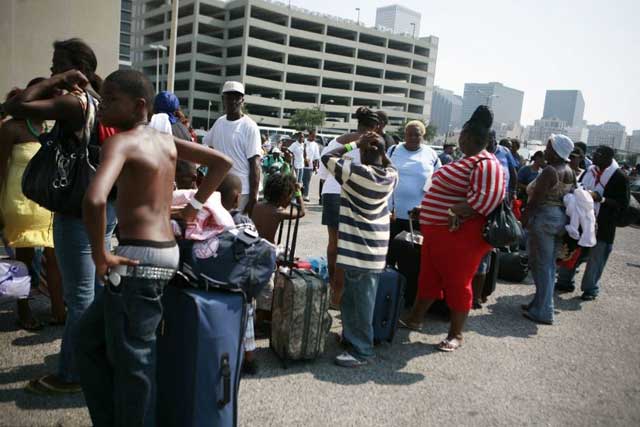Your support helps us to tell the story
From reproductive rights to climate change to Big Tech, The Independent is on the ground when the story is developing. Whether it's investigating the financials of Elon Musk's pro-Trump PAC or producing our latest documentary, 'The A Word', which shines a light on the American women fighting for reproductive rights, we know how important it is to parse out the facts from the messaging.
At such a critical moment in US history, we need reporters on the ground. Your donation allows us to keep sending journalists to speak to both sides of the story.
The Independent is trusted by Americans across the entire political spectrum. And unlike many other quality news outlets, we choose not to lock Americans out of our reporting and analysis with paywalls. We believe quality journalism should be available to everyone, paid for by those who can afford it.
Your support makes all the difference.New Orleans was gripped by an eerily familiar sense of panic yesterday, as Hurricane Gustav, heading for America's Gulf Coast, was upgraded to a category five – the highest possible storm rating, indicating windspeeds of at least 155mph.
Afraid of a repeat of the Hurricane Katrina disaster – a category three when it hit land almost exactly three years ago – thousands got in their cars and clogged the freeways out of the city, while the elderly and sick were being bussed out ahead of an official mandatory evacuation order, expected at 8am local time today.
Meanwhile, Gustav was about to batter western Cuba, prompting 250,000 people to leave low-lying areas in the path of the storm. The Cuban authorities ordered many of Havana's crumbling buildings to be evacuated, for fear they would be unable to weather the storm, and told other residents to find a shelter and barricade themselves in.
In the historic French Quarter of New Orleans, the odd jazz band played on, but most of the bar-lined streets were almost empty. Tourists, who had descended on the city to celebrate this weekend's Labor Day holiday, encountered police with loudhailers directing them on to suddenly crowded freeways.
The New Orleans mayor, Ray Nagin, ordered all visitors to leave the city by nightfall yesterday, and instructed hotels to make guests from out of town check out at first light.
The Central Business District was deserted except for soldiers from the National Guard ordered into the city to check that banks and other potential targets for looters had been securely boarded up.
Gustav has already killed 78 people in the Caribbean, and is now likely to make landfall in the US in the early hours of Tuesday morning. If it hits New Orleans head on, it could produce a surge in sea levels of up to 20ft, engulfing large areas of the coastal city.
President George Bush declared a state of emergency on Friday night, and sent more than 5,000 troops into Louisiana to maintain order during the mandatory evacuation. All flights out of New Orleans were booked up.
A fleet of 700 buses began helping 30,000 residents – many of them elderly and without transport – to leave town. Trains were on hand to take some evacuees to Memphis, while long queues formed at petrol stations.
Although Gustav remains days away, the authorities are taking no chances. "We don't want folks worrying about their property. It is time for people to be worried about their personal safety," said Bobby Jindal, the Governor of Louisiana.
The administration's failure to respond quickly enough to Hurricane Katrina in 2005 was largely blamed for the subsequent devastation, which caused nearly 1,800 deaths and $80m (£44m) in damage, making it the costliest natural disaster in US history.
"If people choose to defy a mandatory evacuation order, we want them to be aware that they are putting themselves in a risky situation," said a spokesman for the Federal Emergency Management Agency (Fema). "We want them to be aware that, once this storm strikes, emergency services may not be in a position to help them."
Much of New Orleans has still not recovered from Katrina, and large areas of the city remain derelict. The last unidentified victims were finally laid to rest only on Friday, during a truncated day of events to commemorate the third anniversary of the storm.
Survivors are anxious to avoid repeating the mistakes that saw large numbers of them remain behind when the last hurricane struck.
Earlier yesterday, Tyler Fernandez, in the still-scarred parish of St Bernard, said: "They say it's now a category five storm, and from what I now know, category five means get the hell out. The way I see it, this storm is God's way of reminding us of the power of Mother Nature."
While most people were boarding up windows and hitting the road, some veterans of Katrina were reluctant to leave their properties, in case of a repetition of the widespread looting that followed the disaster. Even if Gustav has petered out by the time it arrives, they fear it may take days or even weeks to get back to their homes.

Join our commenting forum
Join thought-provoking conversations, follow other Independent readers and see their replies
Comments